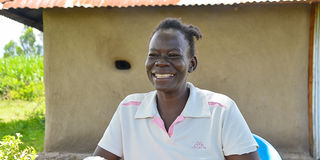'I didn't know I was pregnant until I gave birth'

Ms Beatrice Akinyi holds her baby during the interview at her home in Kibigori centre, Kisumu County.
What you need to know:
- An abdominal pregnancy occurs when a fertilised egg implants and grows outside the uterus in the abdominal cavity, usually within the peritoneal cavity.
- Due to its variability of clinical presentation, the pregnancy often poses a significant challenge in diagnosis and treatment.
When Beatrice Akinyi gave birth early this year, she named her baby Miracle Achieng. It was a tiny miracle that had caught her by surprise. Beatrice spent five months totally unaware that she was pregnant. For a mother of three who had mastered the rhythms and dynamics of child bearing, learning of her pregnancy at 24 weeks came as a shocker.
A few months earlier, she had complained of excruciating pain below her abdomen that doctors diagnosed as an infection.
"I was also diagnosed with malaria, stomach infection and low blood pressure,” Beatrice, 38, tells Healthy Nation at her home in Kibigori, Muhoroni, Kisumu County.
She would then be hospitalised for a week at a health facility in Muhoroni, but her situation did not get any better.
After being discharged, a friend referred her to a herbalist, who after examination while massaging her belly announced that Beatrice had a swollen abdomen.
The herbalist administered a herbal concoction while promising that the pain would go away. But it didn’t.
Little did Beatrice know that she was five months pregnant. "I only came to know that the excruciating abdominal pain was a result of an abdominal pregnancy when I was five months pregnant," says Beatrice, who still finds it hard to believe that she could be pregnant for that long without knowing it.
An abdominal pregnancy occurs when a fertilised egg implants and grows outside the uterus in the abdominal cavity, usually within the peritoneal cavity.
According to the National Institutes of Health, abdominal pregnancy is the least common type of ectopic pregnancy representing one per cent of the ectopic pregnancies; with an incidence of one per 10,000 live births.
The rare pregnancy can be primarily located in the peritoneal cavity or secondary to a ruptured ectopic pregnancy or tubal abortion.
Due to its variability of clinical presentation, the pregnancy often poses a significant challenge in diagnosis and treatment.
For Beatrice, the pregnancy came with almost undetectable symptoms such that at the onset of the abdominal pains in September 2023, the last thing she could have thought of was having conceived. “I would also have my periods every month. The only difference was that unlike previously when I would have my menses for four days, I would only have them for two days.”
She also often complained of fatigue.
One morning, Beatrice was rushed to Kibigori dispensary after fainting due to the prolonged abdominal pains.
A health worker advised that she visits an equipped health facility for scanning.
The next day, Beatrice travelled to Jaramogi Oginga Odinga Teaching and Referral Hospital (JOOTRH), where an ultrasound confirmed that she was pregnant.
The foetus in her abdomen was five months old.
“I also learnt that having the baby in my abdomen was too risky and she had to be delivered via caesarean section as soon as possible. However, the procedure could not be done immediately since my blood pressure was still low.”
On January 10, Beatrice, whose blood pressure had now stabilised, was wheeled into theatre, where she delivered a baby girl at 26 weeks of gestation.
Baby Miracle weighed 900.9 grammes and her mother could barely tell her gender. She was placed in an incubator as her mother constantly expressed breast milk to feed her. Beatrice also adopted kangaroo mother care at the facility and soon the baby started gaining weight.
Baby Miracle was discharged from JOOTRH in mid-April weighing 2.5 kilogrammes.
Although the baby, who will be turning four months old on May 10, is healthy, Beatrice says she is struggling to afford baby formula because she is currently financially unstable.
“I have resorted to feeding her cow milk.”
Dr Dennis Miskellah, an obstetrician and gynaecologist at Kenyatta National Hospital, says after fertilisation, the zygote is often implanted on the walls of the uterus in normal pregnancies and in fallopian tube for ectopic pregnancies.
In an abdominal pregnancy, however, the zygote moves away from the fallopian tube and falls off into the abdominal cavity, where it is implanted.
This is followed by the development of a placenta that may attach the zygote to the intestines.
The mother in this case may end up having abdominal and stomach pains, constipation and diarrhoea, which can be easily mistaken for a stomach infection, ulcers and malaria.
“The condition may be life-threatening especially if the zygote fails to attach properly to the abdominal cavities, which leads to uncontrolled bleeding and could result in death,” says Dr Miskellah.
He notes that without the required hospital equipment and skilled specialist, the pregnancy may go undetected.
On most occasions, the unborn baby may be lost due to a number of challenges including limited flow of nutrients and blood supply due to failure to get implanted in the uterus.
The baby will also suffer from restricted growth and foetal malformations while growing in the abdomen, which always fails to enlarge
Other dangers of abdominal pregnancies include intestinal obstruction and abscess.
While in some instances a mother can carry the pregnancy to term, the obstetrician says this might be challenging to a number of women due to the abdominal pains, bleeding and a risk of foetal death.
“Such a baby can only be delivered via caesarean section,” says the doctor, adding that after birth, the placenta is always left in the abdomen since removing it may cause injuries to internal body organs; including the intestines.





